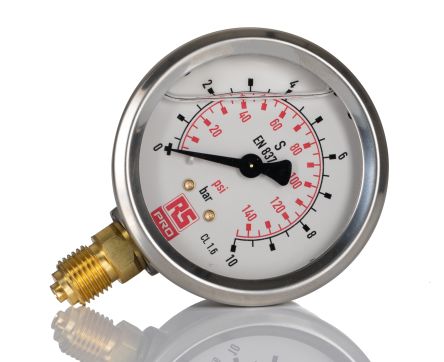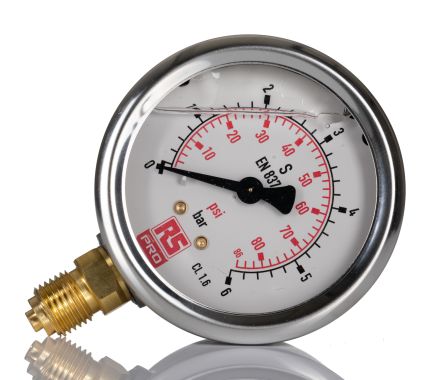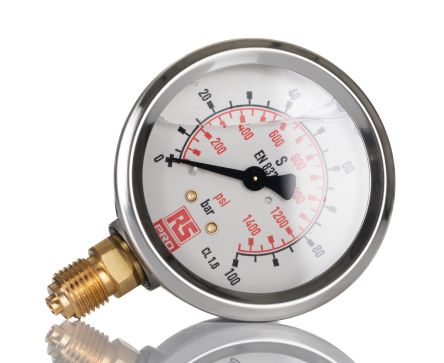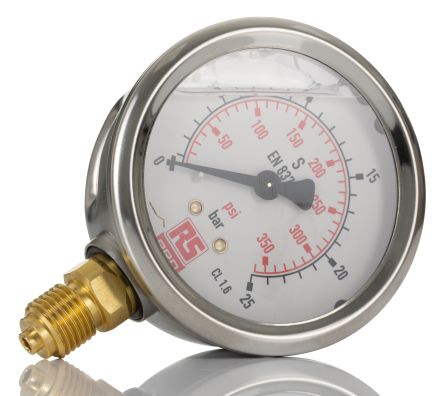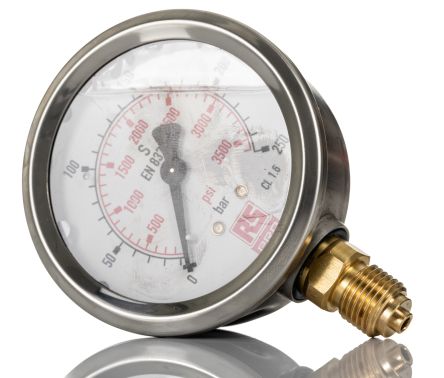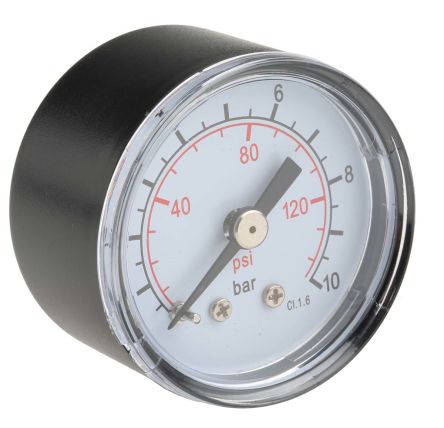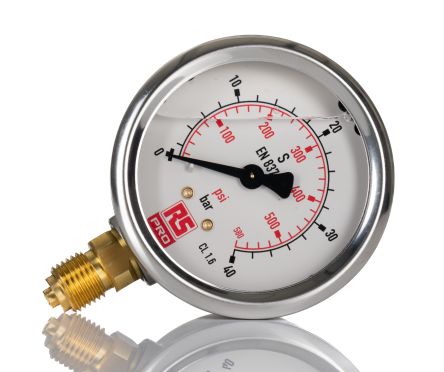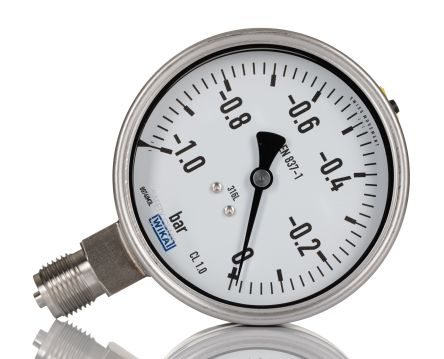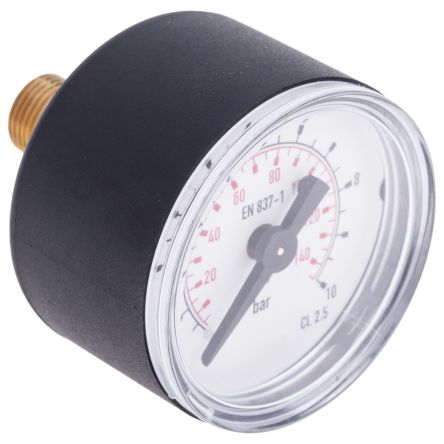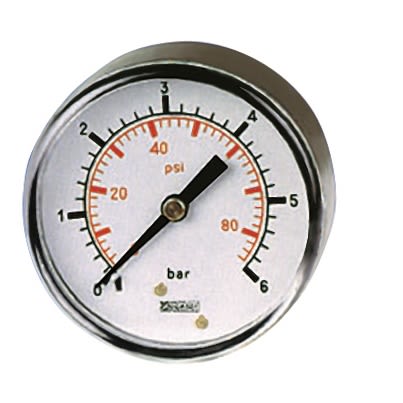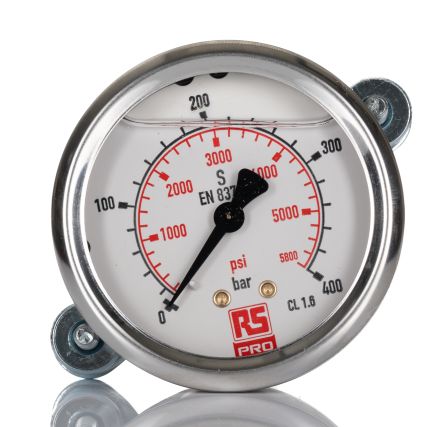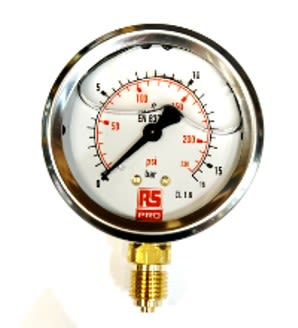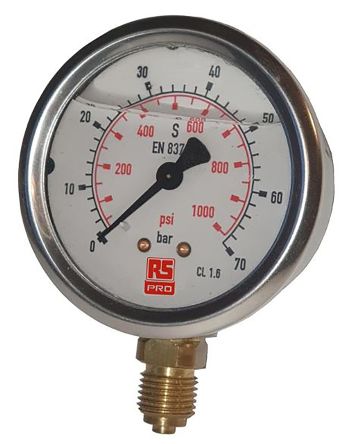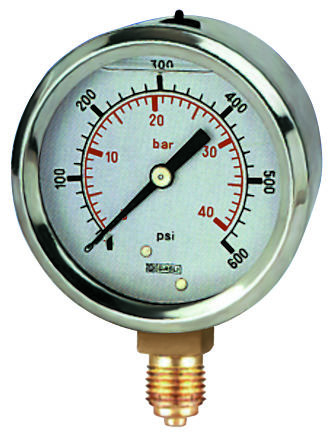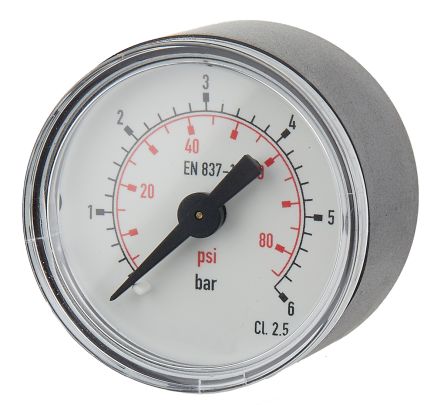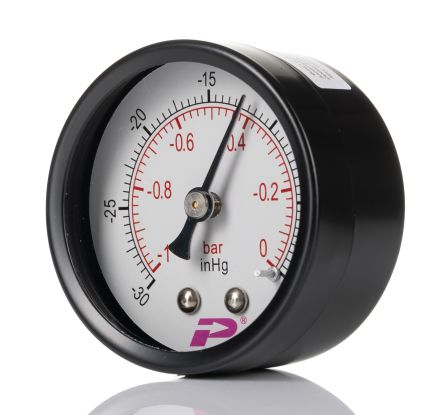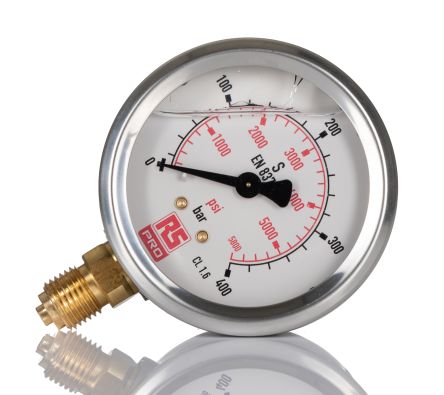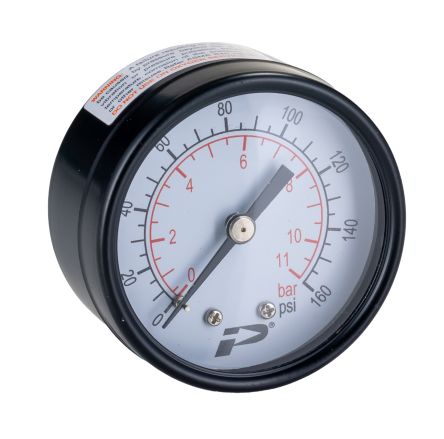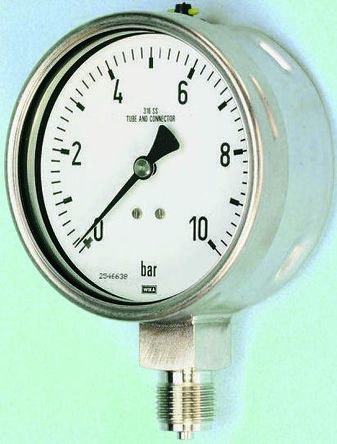- Automation & Control Gear
- Cables & Wires
- Enclosures & Server Racks
- Fuses & Circuit Breakers
- HVAC, Fans & Thermal Management
- Lighting
- Relays & Signal Conditioning
- Switches
- Batteries & Chargers
- Connectors
- Displays & Optoelectronics
- ESD Control, Cleanroom & PCB Prototyping
- Passive Components
- Power Supplies & Transformers
- Raspberry Pi, Arduino, ROCK, STEM Education & Development Tools
- Semiconductors
Pressure Gauges
Pressure gauges are essential instruments used to measure and display pressure or vacuum within fluid power systems. They provide crucial information for monitoring system performance, preventing damage, and ensuring safety in various industrial and commercial applications. RS Australia offers a wide range of pressure gauges, including analogue and digital pressure gauges, and specialised options like hydraulic and air pressure gauges, from leading suppliers like Bourdon, WIKA, and RS PRO.
Analogue Pressure Gauges
Analogue pressure gauges, also known as analog pressure meters, display pressure measurements on a dial using a needle that moves in response to pressure changes. The needle’s movement is typically controlled by a spring or a tube that changes with pressure. It is important to ensure that your dial can read the pressure range within your system. Some pressure gauges can read up to 5000 psi or 7500 psi. The pressure scale range is also measured in "bar".
Digital Pressure Gauges
Digital pressure gauges utilise microprocessors and sensors to provide accurate pressure readings on an integrated digital display. They can provide precise measurements with high resolution, often down to 0.001 or 0.01 units. Many digital pressure gauges offer data-logging capabilities and can communicate with other devices or systems for remote monitoring and analysis. They are typically bottom entry and come in various diameters. These gauges can be used to measure hydraulic or pneumatic pressure.
Do My Pressure Gauges Need Calibration?
Regular calibration of pressure gauges is essential to ensure the instrument is operating correctly and within the manufacturer's specifications. Calibration involves comparing the gauge’s readings to a known standard and adjusting it as needed. RS offers in-house calibration services to ensure your pressure gauges meet your accuracy equipment.
Other things to consider when choosing a pressure gauge include:
- Operating Temperature: Select a gauge with a temperature range suitable for your application's environment.
- Accuracy: Choose an accuracy level that meets your measurement needs.
- Mounting Type: Consider the mounting type, such as panel mount or surface mount, based on your installation requirements.
What Are Pressure Gauges Made From?
Pressure gauges are typically constructed from materials that can withstand the pressures and environmental conditions they will be exposed to. Common materials include:
- Stainless Steel: Offers excellent corrosion resistance, durability, and high-pressure capabilities.
- Brass: Provides good corrosion resistance and is often used for water pressure gauges and general-purpose applications.
- Plastic: Lightweight and cost-effective, suitable for less demanding applications.
- Aluminium: Lightweight and corrosion-resistant, often used in applications where weight is a concern.
How to Choose the Right Pressure Gauge for Your Application
Selecting the appropriate pressure gauge involves careful consideration of several factors:
- Determine the Pressure Range: Choose a gauge with a pressure range that encompasses the expected operating pressures of your system.
- Consider the Media Type: Ensure the gauge's materials and construction are compatible with the fluid or gas being measured.
- Select the Appropriate Material and Construction: Consider factors such as corrosion resistance, temperature resistance, and pressure capabilities when choosing the gauge's material and construction.
- Evaluate the Accuracy and Precision: Select a gauge with an accuracy and precision level that meets your application requirements.
- Assess the Environmental Conditions: Consider the environmental conditions, such as temperature, humidity, and vibration, and choose a gauge with appropriate protection and durability.
The Importance of Accurate Pressure Gauges in Industrial Settings
Accurate pressure gauges are indispensable in industrial settings, contributing to safety, efficiency, and overall operational effectiveness.
- Ensuring Safety: Accurate pressure gauges provide critical information for monitoring system pressures, preventing overpressure situations that could lead to equipment failure, leaks, or even explosions. This is crucial for safeguarding personnel, equipment, and the environment.
- Improving Efficiency and Performance: By providing real-time pressure data, accurate gauges enable operators to optimise system performance, adjust settings, and ensure efficient operation of machinery and processes.
- Preventing Equipment Damage and Downtime: Pressure gauges help prevent costly damage to equipment by detecting abnormal pressure fluctuations and enabling timely intervention. This minimises downtime and maintenance costs.
- Enhancing Quality Control: In processes where pressure is a critical parameter, accurate pressure gauges contribute to maintaining consistent product quality and preventing defects.
- Complying with Industry Regulations: Many industries have strict regulations regarding pressure monitoring and safety. Accurate pressure gauges ensure compliance with these standards, preventing potential penalties or legal issues.
- Reducing Costs and Waste: By optimising system performance and preventing equipment failures, accurate pressure gauges contribute to reducing operational costs, energy consumption, and waste generation.
Industrial Application of Pressure Gauges
Pressure gauges are used in a wide range of industrial applications, providing essential pressure monitoring and control across various sectors:
- Discrete Manufacturing: In discrete manufacturing, pressure gauges monitor pneumatic and hydraulic systems in machinery, robots, and assembly lines, ensuring safe and efficient operation. They also monitor pressure in processes like injection moulding and welding.
- Process Manufacturing: Pressure gauges are critical in process industries, such as chemical, pharmaceutical, and food processing, for monitoring pressure in reactors, vessels, and pipelines. They ensure process safety, product quality, and regulatory compliance.
- Energy & Utilities: The energy and utilities sector relies on pressure gauges for monitoring pressure in power plants, pipelines, and other critical infrastructure. They ensure safe operation, prevent leaks, and optimise energy efficiency.
- Facilities & Intralogistics: Pressure gauges monitor HVAC systems, compressed air systems, and other building systems in facilities and intralogistics operations. They ensure efficient operation, prevent equipment failures, and maintain a safe and comfortable environment.
Ordering Pressure Gauges From RS Australia
RS is your reliable source for high-quality pressure gauges at competitive prices. Our selection spans various types and models, with a range of pressure ratings, accuracies, and features to suit diverse applications.
We also carry other essential instrumentation and process control components, such as pressure sensors and other calibration equipment, to provide comprehensive solutions for your pressure measurement needs. Order your pressure gauges online today. For more details on our ordering process, delivery services, and delivery fees, please refer to our Delivery Page.
Popular Searches
Related links
- Pneumatic & Hydraulic Pressure Gauges
- RS PRO Tyre Pressure Gauge
- Tyre Inflators
- Pressure Sensors
- Druck G 1/4 Digital Pressure Gauge 200bar Bottom Entry 95mm...
- WIKA G 1/2 Digital Pressure Gauge 700bar Bottom Entry 100mm...
- WIKA G 1/2 Digital Pressure Gauge 40bar Bottom Entry 100mm Outside Diameter
- Parker 1/4 in Digital Pressure Gauge 600bar Bottom Entry
